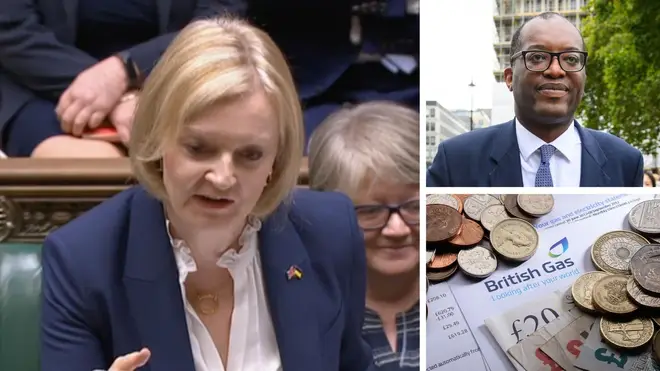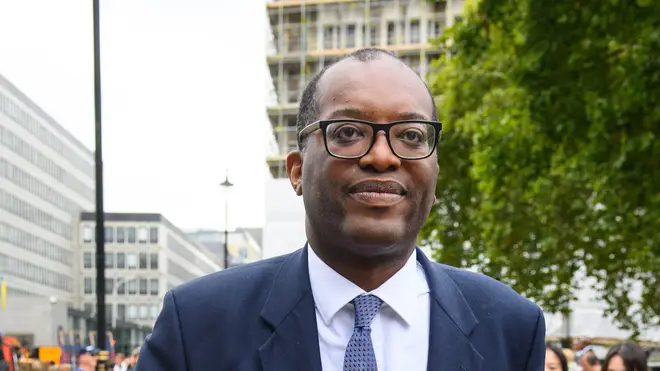
Shelagh Fogarty 1pm - 4pm
8 September 2022, 01:30 | Updated: 8 September 2022, 09:23

Prime Minister Liz Truss is set to freeze energy bills for two years, launch a dash for North Sea gas and restart fracking in a bid to tackle spiralling energy costs.
The newly-appointed leader will announce her "bold plan of action" on Thursday, intended to support families facing crippling bills as well as ramping up domestic energy supply.
She is expected to reveal both short and long-term solutions to help people's incomes go further and boost economic growth.
Domestic energy bills are set to be frozen at around £2,500 as part of the package - said to cost up to £150 billion.
The freeze could last for up to two years - until the next general election in 2024 - and would be funded by increased borrowing, the Times suggested.
Liz Truss is set to announce her plan for tackling energy bills at 11.15am – you can follow the latest on LBC on Global Player

Meanwhile, in another controversial move, it is understood that Ms Truss will also declare she is lifting the ban on fracking.
Additionally, she is expected to confirm that she is scrapping green levies on energy bills and declare her support for more North Sea drilling.
The full plans will be outlined in parliament, opening the debate on UK energy costs among MPs.
Read more: Truss is 'harking back to Thatcherism' but the UK 'needs the polar opposite', says Andy Burnham
Read more: Queen postpones Privy Council meeting after doctors advise her to rest

Liz Truss' new 'diverse' cabinet
Labour pointed to prior comments from new Chancellor Kwasi Kwarteng, who argued that those calling for the return of onshore fracking "misunderstand the situation we find ourselves in".
In March, he wrote in The Mail on Sunday: "Even if we lifted the fracking moratorium tomorrow, it would take up to a decade to extract sufficient volumes - and it would come at a high cost for communities and our precious countryside.
"No amount of shale gas from hundreds of wells dotted across rural England would be enough to lower the European price any time soon.
"And with the best will in the world, private companies are not going to sell the shale gas they produce to UK consumers below the market price. They are not charities, after all."

But Ms Truss remained optimistic about her plans, earlier stating: "I know families and businesses across the country are worried about how they are going to make ends meet this autumn and winter.
"Putin’s war in Ukraine and weaponisation of gas supply in Europe is causing global prices to rise – and this has only made clearer that we must boost our long-term energy security and supply.
"We will take action immediately to help people and businesses with bills but also take decisive action to tackle the root cause of these problems, so that we are not in this position again.
"We will set out our plans to deliver on that promise and build a prosperous Britain for everyone."

Andy Burnham: Liz Truss is harking back to Thatcherism
It comes after Ms Truss pledged "immediate action" in her first Prime Minister's Questions.
When asked by Labour leader Sir Keir Starmer why she was opposed to taxing oil and gas companies despite the fact they are set to make billions in profits, Ms Truss said she understood people were struggling with high costs and said she "will be making an announcement to this house on that tomorrow".
But she also said it could not just be "a sticking plaster" and there had to also be a long-term solution."What we need to do is increase our energy supplies long term," she said.
"That is why we will open up more supply in the North Sea... that is why we will build more nuclear power stations... that is why we will get on with delivering the supply as well as helping people through the winter."

Lord Hammond 'concerned' over Liz Truss's energy funding
New Cabinet members were seen making their way into No10 earlier on Wednesday to tackle the first thing on their to-do list - soaring energy bills.
Business Secretary Jacob Rees-Mogg, Chancellor Kwasi Kwarteng, Foreign Secretary James Cleverly, Transport Secretary Anne-Marie Trevelyan and Home Secretary Suella Braverman were among those who greeted reporters as they entered Downing Street.